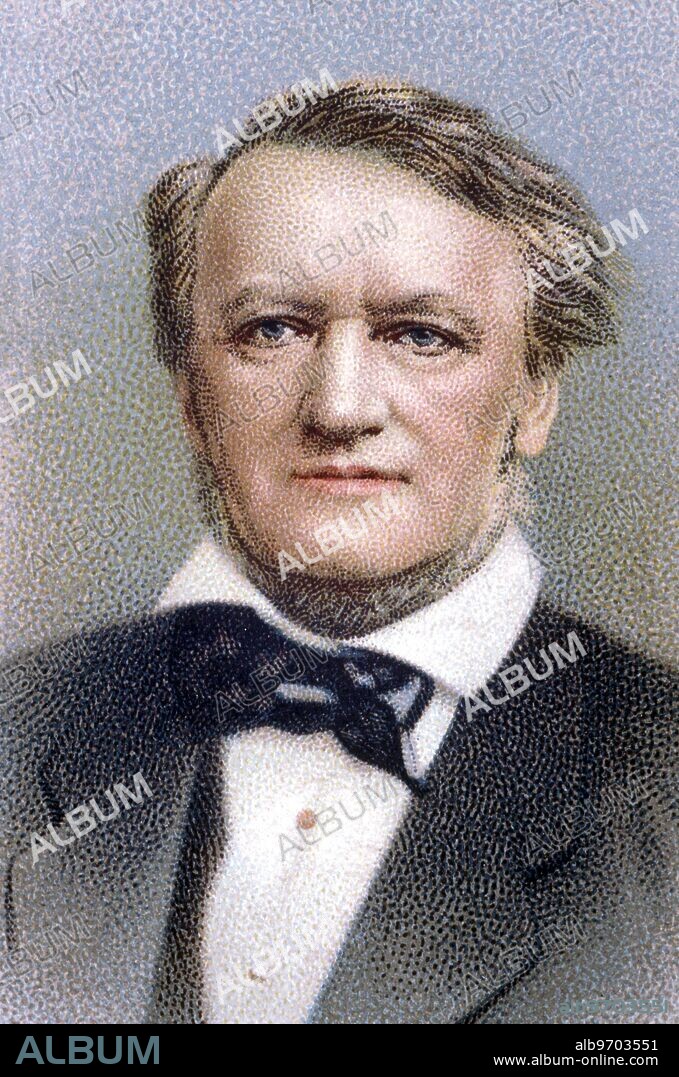alb9703551
Richard Wagner 1813-1883 - German opera composer. He revolutionised the 19th century conception of opera, envisaging it as a wholly new art form in which musical, poetic, and scenic elements should be unified through such devices as the leitmotif. His operas include Tannhauser 1845, Lohengrin 1850, and Tristan and Isolde 1865. In 1872 he founded the Festival Theatre in Bayreuth: his masterpiece Der Ring des Nibelungen/The Ring of the Nibelung, a sequence of four operas, was first performed there in 1876. His last work, Parsifal, was produced in 1882. Wagner's early career was as director of the Magdeburg Theatre, where he unsuccessfully produced his first opera Das Liebsverbot/Forbidden Love 1836. He lived in Paris 1839-42 and conducted the Dresden Opera House 1842-48. He fled revolution, but in 1981 he was allowed to return. He won the favour of Ludwig II of Bavaria 1864 and was thus able to set up the Festival Theatre in Bayreuth. The Beyreuth tradition was continued by his wife Cosima (Liszt's daughter, whom he married after her divorce from Hans von Bulow), by his son Siegfried Wagner (1869-1930), a composer of operas such as Der Barenhauter, and by later descendants.

|
Ajouter à une autre Lightbox |
|
Ajouter à une autre Lightbox |



Avez-vous déjà un compte? S'identifier
Vous n'avez pas de compte ? S'inscrire
Acheter cette image.
Sélectionnez l'usage:

Légende:
Voir la traduction automatique
Richard Wagner 1813-1883 - German opera composer. He revolutionised the 19th century conception of opera, envisaging it as a wholly new art form in which musical, poetic, and scenic elements should be unified through such devices as the leitmotif. His operas include Tannhauser 1845, Lohengrin 1850, and Tristan and Isolde 1865. In 1872 he founded the Festival Theatre in Bayreuth: his masterpiece Der Ring des Nibelungen/The Ring of the Nibelung, a sequence of four operas, was first performed there in 1876. His last work, Parsifal, was produced in 1882. Wagner's early career was as director of the Magdeburg Theatre, where he unsuccessfully produced his first opera Das Liebsverbot/Forbidden Love 1836. He lived in Paris 1839-42 and conducted the Dresden Opera House 1842-48. He fled revolution, but in 1981 he was allowed to return. He won the favour of Ludwig II of Bavaria 1864 and was thus able to set up the Festival Theatre in Bayreuth. The Beyreuth tradition was continued by his wife Cosima (Liszt's daughter, whom he married after her divorce from Hans von Bulow), by his son Siegfried Wagner (1869-1930), a composer of operas such as Der Barenhauter, and by later descendants.
Crédit:
Album / Ken Gibson / TopFoto
Autorisations:
Taille de l'image:
2061 x 3106 px | 18.3 MB
Taille d'impression:
17.4 x 26.3 cm | 6.9 x 10.4 in (300 dpi)
Mots clés:
 Pinterest
Pinterest Twitter
Twitter Facebook
Facebook Copier le lien
Copier le lien Email
Email
